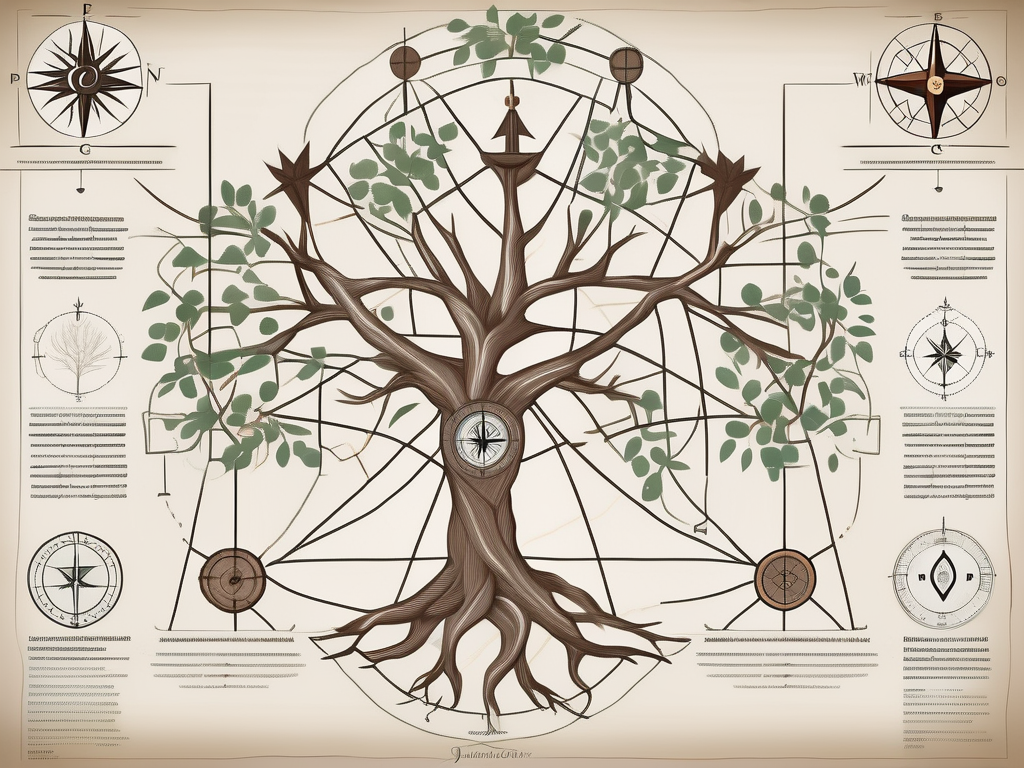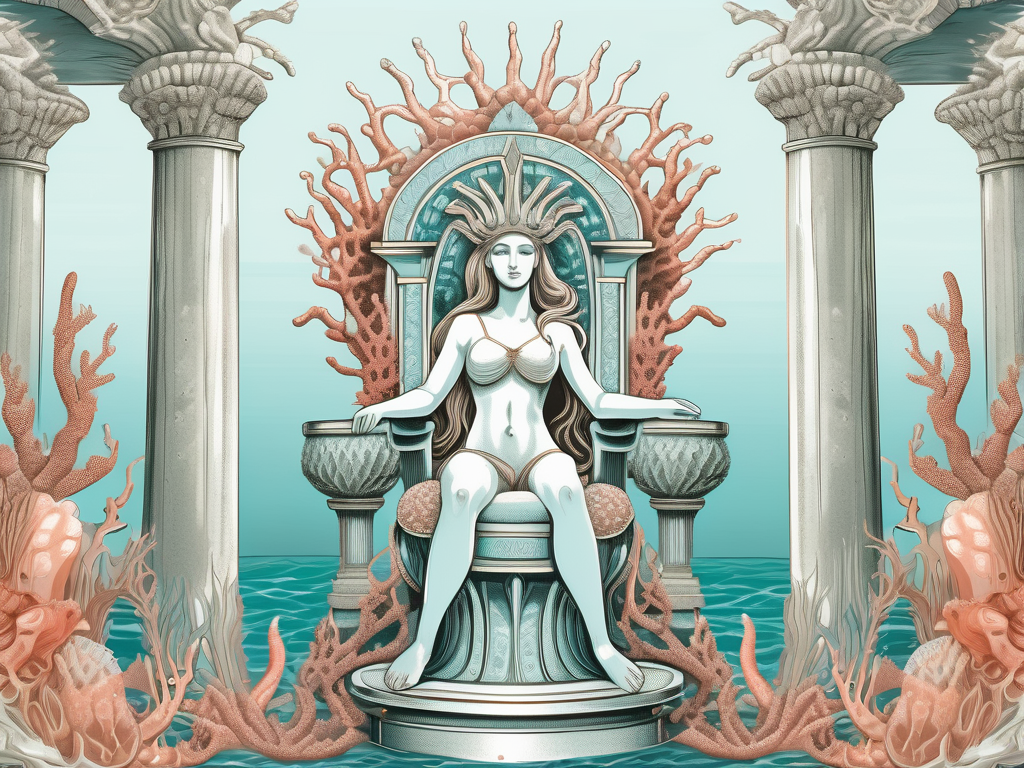Have you ever wondered about the enigmatic figure of Glaucus in Greek mythology? This fascinating deity has captivated the imagination of countless storytellers and artists throughout the ages, leaving behind a rich tapestry of myths and legends. Join us as we embark on a journey to unravel the secrets surrounding Glaucus and delve into the depth of his character and significance in ancient Greek culture.
The Mythical Origins of Glaucus
Like many other ancient Greek gods, Glaucus emerged from the depths of divine genealogy. He was born to the sea god Poseidon and the sea nymph Nereid, bringing with him a heritage as vast and mysterious as the ocean itself. Glaucus’ lineage entwined with the stories of other mythical beings, creating a network of connections that spanned across the pantheon of Greek gods and goddesses.
As the son of Poseidon, Glaucus inherited the power and majesty of the sea. From a young age, he was drawn to the ocean’s depths, fascinated by its ever-changing currents and hidden treasures. His mother, the beautiful Nereid, nurtured his curiosity and taught him the secrets of the sea, instilling in him a deep respect and reverence for its power.
Glaucus grew up in the underwater palaces of his father’s realm, surrounded by the enchanting melodies of mermaids and the shimmering glow of bioluminescent creatures. He spent his days exploring the coral reefs, swimming alongside dolphins and playing with mischievous sea nymphs. The sea became his playground, and its inhabitants his closest companions.
Glaucus in Greek Mythology
In Greek mythology, Glaucus is primarily known as the god of the sea. He ruled over the vast expanse of the ocean, commanding its waves and tempests with unrivaled power. As such, Glaucus was revered and feared by ancient mariners, who sought his favor and protection during their treacherous voyages. The sailors would offer prayers and sacrifices to Glaucus, hoping to appease his mighty wrath and ensure safe passage through his domain.
But beyond his dominion over the seas, Glaucus possessed a unique ability that set him apart from his divine peers. He had the gift of prophecy, a rare and coveted power that allowed him to glimpse into the future. Glaucus would often share his visions with mortals, guiding them through the treacherous waters of life and offering them glimpses of their destinies.
It is said that Glaucus’ prophecies were so accurate and insightful that kings and warriors would seek his counsel before embarking on important quests or engaging in battles. His wisdom and foresight became legendary, and his words carried the weight of divine truth.
The Transformation of Glaucus
One of the most intriguing aspects of Glaucus’ character is his transformative nature. According to ancient texts, Glaucus had the power to transform himself into various forms, allowing him to navigate both the vast depths of the oceans and the bustling world of mortals. This ability gave him an unprecedented level of versatility, making him a deity who straddled the boundaries between myth and reality.
When Glaucus ventured onto land, he would often take the form of a handsome young man, with flowing hair and piercing blue eyes that mirrored the depths of the sea. In this guise, he would walk among mortals, observing their lives and occasionally intervening to guide them towards their destinies.
But Glaucus’ true form was that of a majestic sea creature, with shimmering scales and a powerful tail that could propel him through the water with incredible speed. His appearance was both awe-inspiring and terrifying, as he commanded the respect and fear of all who encountered him.
Legend has it that Glaucus’ transformative powers were a gift from the gods, bestowed upon him as a reward for his unwavering loyalty and devotion. With this ability, he could traverse the realms of gods and mortals, bridging the gap between the divine and the earthly.
Glaucus’ Role and Powers
As the god of the sea, Glaucus held immense influence over the maritime realm. Sailors would often invoke his name before setting sail, seeking his guidance and protection against the perils of the open waters. But Glaucus’ powers extended far beyond the realm of navigation. He was also revered for his prophetic abilities, which held great significance in the ancient Greek world.
Legend has it that Glaucus was born mortal, but through a series of extraordinary events, he transformed into a divine being. It is said that he was a fisherman who, one day, caught a magical fish. When he ate this enchanted creature, he experienced a profound metamorphosis, becoming part man and part sea creature. This transformation granted him unparalleled knowledge of the ocean and its mysteries.
Glaucus as the Sea God
Glaucus’ role as the sea god made him a central figure in the lives of those whose livelihoods depended on the oceans. Fishermen, traders, and explorers all turned to Glaucus for blessings and protection, praying for successful journeys and bountiful catches. His iconic trident symbolized his authority over the sea, and his presence was felt in every crashing wave and swirling current.
According to ancient tales, Glaucus had the ability to control the tides, ensuring safe passage for those who worshipped him. Sailors believed that by appeasing Glaucus, they could avoid treacherous storms and navigate the vast expanse of the sea with ease. It was believed that Glaucus would guide lost ships back to shore and protect them from the wrath of Poseidon, the god of the sea.
The Prophetic Abilities of Glaucus
In addition to his dominion over the seas, Glaucus possessed the rare gift of prophecy. Ancient Greeks believed that he had the power to glimpse into the future, offering invaluable insights and guidance to those wise enough to seek his counsel. Kings and warriors would often consult Glaucus before embarking on important campaigns, hoping to gain an edge in their battles and conquests.
It was said that Glaucus could communicate with sea creatures and interpret their behavior as omens. Dolphins, in particular, were believed to be messengers of Glaucus, conveying his prophecies to those who could understand their language. The wisdom he imparted was highly sought after, as it could mean the difference between victory and defeat on the battlefield or success and failure in matters of state.
Furthermore, Glaucus was known to appear in dreams, providing visions of the future to those he deemed worthy. These dreams were often vivid and filled with symbolism, requiring skilled interpreters to decipher their true meaning. Many sought Glaucus’ guidance through rituals and offerings, hoping to receive a glimpse into their destiny and make informed decisions that would shape their lives.
Iconography of Glaucus
The captivating figure of Glaucus has been immortalized in various forms of art and literature throughout history. From ancient sculptures to contemporary paintings, his image has endured, capturing the imagination of artists and viewers alike.
Depictions of Glaucus in Ancient Art
Ancient Greek artists portrayed Glaucus in various forms, reflecting his ability to transform and adapt. Sculptures depicted him with a powerful physique, reminiscent of his divine heritage, while also incorporating motifs related to the sea, such as seashells and fish. These representations showcased the dual nature of Glaucus and emphasized his connection to both land and sea.
Glaucus in Literature and Poetry
Glaucus’ captivating persona extended beyond visual art and into the realm of literature and poetry. Ancient Greek poets invoked his name in their verses, weaving tales of his adventures and exploits. From the epic works of Homer to the lyrical verses of Sappho, Glaucus’ presence reverberated through the pages of countless literary masterpieces, ensuring his enduring legacy.
Glaucus’ Love Interests and Tragic Romances
Love and romance are often intertwined with tales of divine beings, and Glaucus is no exception. He is known for his fateful encounters with various mythical figures, with some of these relationships ending in tragedy and heartbreak.
The Unrequited Love of Scylla
One of the most famous romantic legends involving Glaucus is his ill-fated love for the nymph Scylla. Glaucus fell deeply in love with her, but Scylla rejected his advances due to her own enchantment with another. Heartbroken, Glaucus sought the aid of the sorceress Circe, who transformed Scylla into a horrific creature with six heads and twelve legs, forever out of Glaucus’ reach.
Other Romantic Legends of Glaucus
Aside from his tragic affair with Scylla, Glaucus was also linked to other mythical love interests. Tales speak of his encounters with goddesses such as Aphrodite and Calypso, each imbued with their own unique nuances and consequences. These stories showcase the depths of Glaucus’ desires and the complexities of divine romance.
The Cultural Impact of Glaucus
Although rooted in ancient mythology, Glaucus’ influence continues to resonate in modern culture. From literature to film, his character has found its way into various forms of media, perpetuating his eternal presence in the collective consciousness.
Glaucus in Modern Media
In contemporary literature and film, Glaucus often appears as a symbol of the overwhelming power and mystery of the sea. His character serves as a reminder of the vastness of the oceans and the unfathomable depths that lie beneath their shimmering surface. This portrayal immortalizes Glaucus as an emblematic figure, forever etched into the modern imagination.
The Influence of Glaucus on Maritime Tradition
Throughout history, Glaucus has played a significant role in shaping maritime traditions. Sailors and seafarers continue to invoke his name, seeking his blessings and protection during perilous journeys. The tales of Glaucus have become woven into the fabric of nautical lore, serving as a reminder of the timeless connection between humanity and the vast expanses of the ocean.
In conclusion, the enigma of Glaucus continues to fascinate and intrigue to this day. Whether as the god of the sea, a transformative figure, or a tragic lover, Glaucus embodies the complexities and mysteries that lie within the realm of mythology. His character has endured through art, literature, and cultural traditions, carving a lasting place for him in the tapestry of ancient Greek mythology. As we delve into the depths of Glaucus’ story, we unearth a greater understanding of the profound role he played in the hearts and minds of those who once worshipped him.












